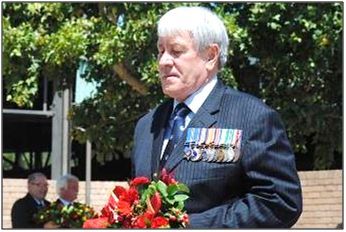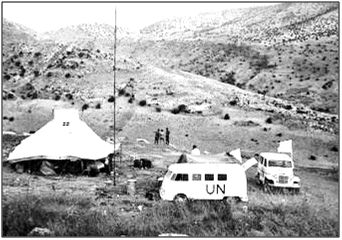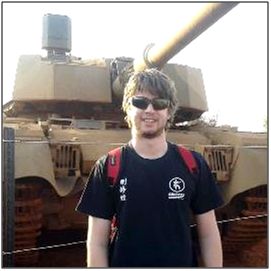


Curtain Raiser: "70 years of United Nations peace keeping operations"

Charles Ross.
Turning to worldwide peacekeeping operations, Charles Ross presented all members present with a talk on the UN's peacekeeping operations over the last 70 years since the end of WWII. Established in 1945 the Charter of the United Nations, of which General Jan Smuts wrote the original preamble, was signed on the 26th of June 1945 and came into effect on the 24th of October.
Article one of the Charter states that the organisation is "To maintain international peace and security, and to that end: to take effective collective measures for the prevention and removal of threats to the peace, and for the suppression of acts of aggression or other breaches of the peace, and to bring about by peaceful means, and in conformity with the principles of justice and international law, adjustment or settlement of international disputes or situations which may lead to a breach of the peace".
To achieve the above, the UN Security Council can authorise the deployment of Peace Support Operations (PSO), mandated under either Chapter Six (Pacific Settlement of Disputes), which is classically an inter-positioning force deployed in a temporary security zone, or Chapter Seven (Action with Respect to Threats of the Peace, breaches of the Peace, and Acts of Aggression) or under Chapter Eight (Regional Arrangements).
The first UN PSO was the deployment of the "UN Truce Supervision Organisation", known as UNTSO in May 1948. The role of the mission, comprising mainly unarmed military observers and mandated under Chapter VI of the UN Charter, was to monitor the armistice agreement between Israel and its Arab neighbours, and is still in operation today. In 1956, the UN deployed its first armed PSO with the deployment of the "UN Emergency Force" (UNEF I) to address the Suez Canal conflict. The first, large scale PSO was in 1960 with the deployment of the "UN Operation in the Congo" (ONUC). At its peak, ONUC had nearly 20, 000 military personnel. The mandate of ONUC was amended by UNSC resolution 161, dated 21st of February 1961, to "use force" and again vide resolution 169 dated the 24th of November 1961 to "take vigorous action" under Chapter VII.

Typical UN APO camp in the sixties.
During the 1960's and 70's, the UNSC established a number of short term PSO's. In 1988, the Nobel Committee cited "(UN) the Peacekeeping Forces through their efforts have made important contributions towards the realisation of one of the fundamental tenets of the United Nations. Since 1988, there has been a marked increase in the number of UN PSO's with 57 of the 71 taking place since 1988. The new PSO's changed from the "traditional", i.e. deployment of primarily military observers to more complex "multidimensional", which is designed to ensure the implementation of comprehensive peace agreements and assist in laying the foundation for sustainable peace. At the same time, the nature of conflicts changed from inter-state conflicts to intra-state conflicts and civil wars.
As at the 31st of July 2018, there were 14 UN PSO's, with seven on the African Continent. A total of 91,249 personnel from 124 countries are deployed in these missions with current costs amounting to US 6,8 billion. This includes logistic support to the African Unions Mission in Somalia (AMISOM). South Africa first participated in a UN PSO during the Korean War from 1950 to 1953. Two Squadron South African Air Force was the main element of South Africa's participation. In addition, a squadron of Centurion tanks from the SA Army was seconded to a British army unit for deployment. It is interesting to note that this PSO is not included in the official UN list of peacekeeping operations. Since 2001, the South African National Defence Force (SANDF) has participated in ten UN PSO's. These include MONUC (Democratic Republic of Congo), UNMEE (Eritrea and Ethiopia), UNMIL (Liberia), ONUB (Burundi), UNMIS (Sudan), UNAMID (Darfur-Sudan), UNMIN (Nepal), UNSMIS (Syria) and UNMISS (South Sudan). Currently, South Africa participates in three missions, MONUSCO (Democratic Republic of Congo), UNAMID and UNMISS.
Main lecture:"The Cape Corps: The Union's coloured soldiers in the First World War"
This month's Main lecture was presented by PhD candidate, Kyle Harmse, on a lesser-known, yet interesting insight in to a part of South Africa's military history.

Kyle Harmse.
The Cape Corps were raised in the Union of South Africa to serve in the First World War as an Imperial Service Contingent force. The Cape Corps Contingent was raised by Governor-General Buxton and other "liberal whites", despite the reluctance of Prime Minister Jan Smuts and the South African and National Parties.
When the Union of South Africa had declared war in August 1914, coloureds mostly from the Cape listed voluntarily in large numbers, as the enlisting was seen as an opportunity to be given the chance to fight as men and as citizens of the Union of South Africa. The Corps Regiment was formed under difficult circumstances as it consisted of coloured recruits which were controlled by white men, who had to be pulled together to work as a group.
Recruitment methods, training processes and indoctrination were introduced by the white officers to create and form a cohesive regiment of soldiers that stemmed from diverse backgrounds. Attention was devoted to the Corps' experiences on campaign, one of the first being a serious encounter of contracting tropical disease in East Africa. The resulting difficulty and suffering had to be endured as the Corps was determined to demonstrate its military value and fighting capability under such trying circumstances.
Apart from engagements in German East Africa, the Cape Corps fought in major engagements on Palestinian fronts. Throughout the First World War, the coloured recruits had to maintain an awkward relationship with their white military officers, and despite all of this, managed to form certain bonds of loyalty and kinship with their white male counterparts, which, to a degree, was considered ahead of its time for Union of South Africa standards.
Richard Schütte
Newsletter Scribe
One of our members, Dr. Des Sonnenfeld, contacted the society in August to rightfully complain about a factual error (WWI instead of WWII) that appeared in the July newsletter. These things happen and we apologise for the mistake, and we thank Dr Sonnenfeld for pointing them out to us.
Evert Kleynhans clarified: "In the lecture, Evert put forward the argument in the form of two pertinent questions that arose regarding the Ossewabrandwag's contact with Germany during the Second World War. Firstly, was there definite contact between the Ossewabrandwag and Germany during the war, and if such contact existed, what was the nature and extent thereof. The answer to this first question was straightforward, as the Ossewabrandwag had maintained regular contact with Germany throughout the war. The answer to the second question, especially as to how it relates to the maritime intelligence war waged off the South African coast, was clearly more complex, and formed the basis of the Evert's lecture".
Graham Grist There are a large number of South Africans buried there and they would all have died in the
UK and I am trying to determine exactly where in the UK they died.
If any of your members have an ancestor who is buried in Brookwood Military Cemetery I am
happy to provide a photograph of their headstone free of charge."
David and Peter Scholtz are sponsoring a small bus to Kedar Lodge for the unveiling of a
bust of Winston Churchill on Saturday 13th October - contact David for details -
083-440-1268 or david.scholtz@webberwentzel.com
JOHANNESBURG:
SAMHSEC:
Branch contact details For Cape Town details contact Johan van den Berg 021-939-7923 warbooks@mweb.co.za
"I live in Walton on Thames, Surrey, England and I am researching all those buried at
Brookwood Military Cemetery, Surrey who died in WW1.
FORTHCOMING LECTURES
Thursday 11th October
KZN in Durban:Thursday 8th November
CAPE TOWN: Thursday 11th October
Thursday 11th October
Monday 8th October
For Eastern Cape details contact Malcolm Kinghorn 041-373-4469 culturev@lantic.net
For Gauteng details contact Joan Marsh 010-237-0676 joan@rfidradar.com
For KwaZulu-Natal details contact Roy Bowman 031 564 4669 bowman.roy93@gmail.com
* NOTE*
Fast mirror and backup site BOOKMARK
FOR REFERENCE Main
site * NOTE*